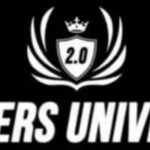Hustlers University 1.0 emerged as a controversial online platform promising quick riches through various “hustle” strategies. The program quickly gained popularity, attracting a vast audience eager for financial independence. However, its meteoric rise was short-lived, as allegations of scams and unethical practices led to its eventual closure, leaving a trail of controversy and raising critical questions about the future of online education and entrepreneurship.
This exploration delves into the origins, operations, and ultimate downfall of Hustlers University 1.0, examining its impact on online education, the role of social media in its rise and fall, and the experiences of students who participated. It also explores the ethical implications of its business model, the “hustle culture” it fostered, and the need for greater regulation and accountability in the online education space.
Hustlers University 1.0
Hustlers University 1.0, a controversial online program that promised to teach individuals how to make money online, emerged in 2021 and quickly gained immense popularity. It became a phenomenon, attracting a large following and generating significant buzz within the online community.
Origins and Popularity
Hustlers University 1.0 was founded by Andrew Tate, a controversial internet personality known for his outspoken views and self-proclaimed success in various business ventures. The program was marketed as a shortcut to financial freedom, promising to provide individuals with the skills and knowledge needed to earn substantial income online. Its popularity can be attributed to several factors:
- Tate’s Influencer Status: Andrew Tate’s online presence and large following on social media platforms played a significant role in attracting initial interest and credibility to the program. His self-proclaimed success in business and his controversial persona generated significant curiosity and appeal among his audience.
- Promise of Quick Success: Hustlers University 1.0 marketed itself as a quick and easy way to make money online, appealing to individuals seeking financial independence and a path to rapid wealth accumulation. The program’s marketing materials emphasized the potential for high earnings and the ability to achieve financial success within a short period.
- Accessibility and Affordability: Unlike traditional education programs, Hustlers University 1.0 was relatively affordable and accessible to a wider audience. The program’s low cost and online format made it appealing to individuals seeking a more flexible and cost-effective alternative to traditional education.
Key Features and Offerings
Hustlers University 1.0 offered a variety of courses and resources aimed at teaching individuals various online money-making strategies. These included:
- E-commerce: The program provided guidance on starting and running online businesses, including dropshipping, affiliate marketing, and selling digital products.
- Cryptocurrency Trading: Hustlers University 1.0 offered courses on cryptocurrency trading strategies, aiming to teach individuals how to profit from the volatile cryptocurrency market.
- Social Media Marketing: The program provided training on building and monetizing a social media presence, including strategies for content creation, audience engagement, and influencer marketing.
- Sales and Marketing: Hustlers University 1.0 offered courses on sales and marketing techniques, including copywriting, lead generation, and conversion optimization.
Closure and Controversy
In 2022, Hustlers University 1.0 faced significant controversy and ultimately shut down. The program’s closure was attributed to a combination of factors, including:
- Allegations of Scams and Misleading Marketing: Several individuals who enrolled in Hustlers University 1.0 accused the program of being a scam, alleging that the courses provided little to no practical value and that the marketing materials were misleading. These accusations led to negative press coverage and damaged the program’s reputation.
- Legal Issues: Andrew Tate and his associates faced legal scrutiny and investigations related to alleged criminal activities, including human trafficking and fraud. These investigations cast a shadow over the program and contributed to its closure.
- Lack of Transparency: Critics argued that Hustlers University 1.0 lacked transparency in its operations and failed to provide sufficient evidence of its claimed success. The program’s lack of transparency raised concerns about its legitimacy and fueled skepticism among potential enrollees.
The Business Model of Hustlers University 1.0
Hustlers University 1.0 was a controversial online program marketed as a platform to teach individuals how to make money online. The program was founded by Andrew Tate, a self-proclaimed entrepreneur and influencer known for his controversial views.
Revenue Streams and Profit Margins
Hustlers University 1.0 generated revenue through membership fees. Participants paid a monthly subscription fee to access the program’s content and resources. The exact pricing structure varied over time, but it generally ranged from $49 to $99 per month.
The program’s profit margins were likely significant, considering the low cost of delivering digital content and the high volume of subscribers. However, it’s difficult to determine precise profit margins due to the lack of publicly available financial information.
Ethical Considerations and Potential Legal Issues
Hustlers University 1.0 faced criticism for its marketing tactics and the legitimacy of its teachings. Some critics argued that the program promoted get-rich-quick schemes and predatory business practices, potentially misleading participants into believing they could easily achieve financial success.
Several legal issues arose concerning the program, including allegations of:
- Misleading advertising and false claims about earning potential
- Violation of consumer protection laws due to unsubstantiated promises
- Promotion of unethical or illegal activities
The program also faced scrutiny for its association with Andrew Tate, who has been accused of promoting misogynistic and sexist views.
Comparison to Similar Online Courses or Programs
Hustlers University 1.0 can be compared to other online courses and programs that offer business or entrepreneurial training. However, several key differences set it apart:
- Focus on quick money-making strategies: Hustlers University 1.0 emphasized rapid wealth creation through various online methods, while other programs may offer a broader range of business skills and knowledge.
- Controversial marketing and branding: The program’s aggressive marketing tactics and association with Andrew Tate contributed to its notoriety and attracted criticism.
- Lack of accreditation and regulation: Unlike traditional educational institutions, Hustlers University 1.0 was not accredited and lacked formal regulation, raising concerns about the quality and legitimacy of its teachings.
Other online programs offering business training, such as Coursera, Udemy, and Skillshare, typically emphasize long-term skill development, career advancement, and ethical business practices. These programs often feature accredited courses from reputable institutions and adhere to stricter quality control standards.
The Impact of Hustlers University 1.0 on Online Education
Hustlers University 1.0, a controversial online program that promised to teach students how to make money online, garnered significant attention and ultimately faced closure. The program’s rise and fall provide valuable insights into the evolving landscape of online education and the growing popularity of entrepreneurship.
Lessons Learned from Hustlers University 1.0
The rise and fall of Hustlers University 1.0 offer several lessons for online education platforms, entrepreneurs, and students.
- The Importance of Transparency and Ethical Practices: Hustlers University 1.0 faced criticism for its lack of transparency regarding its business model and its marketing strategies. This lack of transparency contributed to a negative perception of the program and ultimately led to its downfall.
- The Need for Quality Content and Instruction: While the program offered a variety of courses, the quality of the content and instruction was inconsistent. Students reported a lack of practical value and clear guidance in many of the courses.
- The Importance of Community and Support: Hustlers University 1.0 initially emphasized community and support among its members. However, as the program grew, the ability to provide individualized support to each student became increasingly difficult. This lack of individualized support contributed to frustration and dissatisfaction among some students.
- The Dangers of Hype and Overpromising: Hustlers University 1.0’s marketing campaign relied heavily on hype and overpromising, which ultimately led to unrealistic expectations among students. The program’s failure to deliver on its promises contributed to its negative reputation.
The Impact on the Perception of Online Education and Entrepreneurship
The impact of Hustlers University 1.0 on the perception of online education and entrepreneurship is complex and multifaceted.
- Increased Skepticism towards Online Courses: The program’s failure and subsequent negative publicity contributed to increased skepticism towards online courses, particularly those that promise quick riches.
- Erosion of Trust in Online Business Models: The program’s unethical practices and lack of transparency eroded trust in online business models, particularly those that rely on affiliate marketing and other forms of income generation.
- Heightened Awareness of the Importance of Due Diligence: The program’s downfall has heightened awareness of the importance of conducting due diligence before enrolling in online courses or investing in online business opportunities.
- Emphasis on Building a Solid Foundation: The program’s focus on quick wins and shortcuts led to a backlash against this approach, emphasizing the importance of building a solid foundation of knowledge and skills before attempting to make money online.
The Potential for Future Online Courses to Learn from Hustlers University 1.0
The lessons learned from Hustlers University 1.0 can help future online courses avoid similar pitfalls and build a more sustainable and ethical model for online education.
- Prioritize Transparency and Ethical Practices: Future online courses should prioritize transparency regarding their business model, curriculum, and instructors. This includes clearly stating the risks and limitations associated with the program and providing realistic expectations for students.
- Offer High-Quality Content and Instruction: Future online courses should focus on delivering high-quality content and instruction that is practical, relevant, and engaging. This includes providing clear guidance, actionable strategies, and ongoing support for students.
- Cultivate a Supportive Community: Future online courses should foster a supportive community among students by providing opportunities for collaboration, networking, and mentorship. This includes creating a sense of belonging and providing individualized support when needed.
- Emphasize Long-Term Growth and Sustainability: Future online courses should focus on building long-term growth and sustainability for students. This includes emphasizing the importance of developing valuable skills, building a strong online presence, and creating sustainable income streams.
The Role of Social Media in Hustlers University 1.0
Social media played a pivotal role in the promotion and marketing of Hustlers University 1.0. The program leveraged various platforms to reach a wider audience, build a community, and generate buzz.
Social Media Marketing Strategies
Hustlers University 1.0 utilized social media platforms extensively for marketing and promotion. The program’s social media strategy involved:
- Targeted Advertising: Utilizing platforms like Facebook, Instagram, and YouTube, Hustlers University 1.0 ran targeted advertising campaigns to reach individuals interested in entrepreneurship, online business, and making money online. These campaigns were tailored to specific demographics and interests, maximizing the program’s visibility to its ideal audience.
- Influencer Marketing: The program collaborated with prominent influencers and personalities in the business and online marketing space. These influencers promoted Hustlers University 1.0 to their followers, leveraging their established credibility and reach to attract new members.
- Content Marketing: Hustlers University 1.0 created engaging content across social media platforms, including videos, articles, and infographics. This content aimed to educate and inspire potential members, showcasing the program’s value proposition and the success stories of its graduates.
- Community Building: The program actively engaged with its audience on social media, fostering a sense of community and building relationships with potential members. This involved responding to comments, answering questions, and hosting online events.
Key Influencers and Personalities
Several key influencers and personalities were associated with Hustlers University 1.0, playing a significant role in its promotion and marketing. Some notable figures include:
- Andrew Tate: A controversial figure, Andrew Tate was a prominent spokesperson for Hustlers University 1.0. His large online following, particularly among young men, helped the program gain traction and reach a wider audience.
- Other Influencers: In addition to Andrew Tate, Hustlers University 1.0 collaborated with other influencers in the business and self-improvement space. These influencers promoted the program to their followers, leveraging their credibility and reach to attract new members.
Impact of Social Media on Reputation and Reach
Social media significantly impacted Hustlers University 1.0’s reputation and reach. The program’s heavy reliance on social media platforms, particularly the involvement of controversial figures like Andrew Tate, generated significant online discussion and debate. This led to:
- Increased Visibility: Social media discussions and debates surrounding Hustlers University 1.0 helped increase its visibility and awareness. The program gained significant attention, both positive and negative, from a broader audience.
- Controversy and Criticism: The program faced significant criticism and controversy due to its association with controversial figures and its marketing tactics. This negative publicity raised concerns about the program’s legitimacy and ethical practices.
- Growth in Membership: Despite the controversies, Hustlers University 1.0 experienced significant growth in membership. The program’s social media presence and influencer marketing strategies effectively attracted a large number of individuals seeking to learn about business and online marketing.
The Impact on Students and Participants
Hustlers University 1.0, with its promise of rapid wealth generation through various online business models, attracted a diverse student body. The program’s impact on these students was multifaceted, ranging from transformative success stories to instances of disappointment and frustration.
Student Experiences and Outcomes
The experiences of students who participated in Hustlers University 1.0 varied widely. Some individuals reported significant financial gains, while others struggled to achieve any meaningful results. The success or failure of students often depended on their individual circumstances, commitment levels, and the specific business models they pursued.
- Success Stories: Many students found success in areas like affiliate marketing, e-commerce, and social media marketing. They leveraged the knowledge and strategies taught in the program to build profitable businesses and achieve financial independence.
- Mixed Results: A significant portion of students experienced mixed results. They may have achieved some success in certain areas but struggled in others. These students often lacked the necessary dedication, time commitment, or entrepreneurial skills to fully capitalize on the program’s teachings.
- Disappointment and Frustration: Some students were disappointed with the program’s content or the lack of personalized support. They may have found the information to be outdated, lacking in depth, or not applicable to their specific situations. Others felt overwhelmed by the amount of information and struggled to implement the strategies effectively.
Positive and Negative Impacts
The following table summarizes the positive and negative impacts of Hustlers University 1.0 on participants:
| Positive Impacts | Negative Impacts |
|---|---|
| Exposure to various online business models | High-pressure sales tactics and unrealistic expectations |
| Access to a community of like-minded individuals | Lack of personalized support and mentorship |
| Development of entrepreneurial skills and mindset | Overwhelming amount of information and conflicting strategies |
| Potential for financial gain and independence | Focus on quick-rich schemes rather than sustainable business practices |
The Future of Online Entrepreneurship: Hustlers University 1.0
Hustlers University 1.0, despite its controversial nature, has provided valuable insights into the future of online entrepreneurship. Its rapid rise and subsequent downfall highlight the evolving landscape of online education and business opportunities. This section will delve into the lessons learned from Hustlers University 1.0 and explore the emerging trends shaping the future of online entrepreneurship.
The Rise of Online Learning Platforms
The success of Hustlers University 1.0, despite its questionable practices, demonstrates the growing demand for online learning platforms, particularly those focused on practical skills and entrepreneurship. This trend is driven by several factors, including the increasing accessibility of the internet, the desire for flexible learning options, and the growing need for skills relevant to the digital economy.
- The accessibility of the internet has democratized access to knowledge, making online learning a viable option for individuals worldwide.
- The demand for flexible learning options has increased as individuals seek to balance work, family, and personal development. Online platforms provide the flexibility and convenience that traditional education often lacks.
- The rise of the digital economy has created a demand for skills in areas such as digital marketing, social media management, and online business development. Online learning platforms are well-positioned to meet this demand.
The Importance of Community and Mentorship
One of the key factors contributing to Hustlers University 1.0’s success was its strong sense of community and mentorship. The platform provided a space for students to connect with each other, share experiences, and learn from experienced entrepreneurs.
- Online learning platforms that foster a sense of community and provide mentorship opportunities are more likely to succeed.
- Community and mentorship can provide students with support, motivation, and accountability, which are essential for success in online entrepreneurship.
The Need for Ethical and Responsible Practices, Hustlers university 1.0
Hustlers University 1.0’s downfall highlights the importance of ethical and responsible practices in online entrepreneurship. The platform’s misleading claims and questionable business models ultimately led to its demise. This underscores the need for online entrepreneurship platforms to prioritize ethical practices and transparency.
- Online entrepreneurship platforms should focus on providing genuine value to their students and avoid making misleading claims or promoting unrealistic expectations.
- Transparency and accountability are essential for building trust and credibility in the online entrepreneurship space.
The Future of Online Entrepreneurship: A Focus on Authenticity and Value
The future of online entrepreneurship will likely see a shift towards more authentic and value-driven approaches. This means focusing on building genuine relationships with customers, providing high-quality products and services, and creating sustainable businesses. Platforms that prioritize ethics, transparency, and genuine value will be more likely to succeed in the long run.
- Online entrepreneurs will need to focus on building authentic brands and communities that resonate with their target audience.
- The emphasis will be on providing genuine value and solving real problems for customers, rather than simply chasing quick profits.
- Sustainability will become increasingly important, with businesses focusing on ethical practices, environmental responsibility, and long-term growth.
The story of Hustlers University 1.0 serves as a cautionary tale about the pitfalls of online education and the importance of ethical practices in the pursuit of financial success. While the program’s downfall highlights the dangers of unchecked ambition and misleading marketing, it also underscores the need for responsible online education initiatives that prioritize ethical conduct, transparency, and genuine value for students. The future of online entrepreneurship requires a shift towards sustainable and ethical practices, ensuring that the pursuit of success is balanced with integrity and accountability.
Hustlers University 1.0 was a controversial online program that promised to teach people how to make money. While some participants found success, others felt misled. If you’re looking for reliable financial advice, consider seeking out a nonprofit financial advisor near me. They can provide unbiased guidance and help you create a sustainable financial plan, something that Hustlers University 1.0 may not have been able to offer.
Hustlers University 1.0 was a controversial online program that promised to teach people how to make money online. While the program itself was ultimately shut down, its legacy lives on in the online community. You can find plenty of discussions and opinions about Hustlers University 1.0 on hustlers university reddit , where users share their experiences and insights about the program and its impact on their lives.
Hustlers University 1.0 was a controversial online course that promised to teach students how to make money online. While the program was shut down due to legal issues, the methods and techniques taught within it are still relevant. If you’re interested in learning more about these strategies, check out this article on 18 ways to make money hustlers university.
It explores various approaches that were popularized by Hustlers University 1.0, providing insights into the world of online entrepreneurship.






